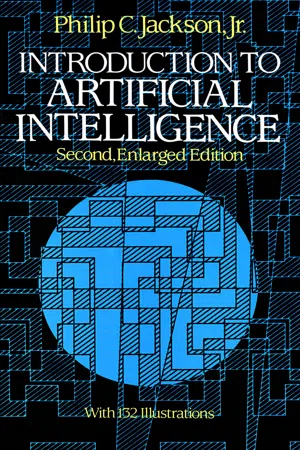
- 512 pages
- English
- ePUB (mobile friendly)
- Available on iOS & Android
About this book
Can computers think? Can they use reason to develop their own concepts, solve complex problems, play games, understand our languages? This comprehensive survey of artificial intelligence ― the study of how computers can be made to act intelligently ― explores these and other fascinating questions. Introduction to Artificial Intelligence presents an introduction to the science of reasoning processes in computers, and the research approaches and results of the past two decades. You'll find lucid, easy-to-read coverage of problem-solving methods, representation and models, game playing, automated understanding of natural languages, heuristic search theory, robot systems, heuristic scene analysis and specific artificial-intelligence accomplishments. Related subjects are also included: predicate-calculus theorem proving, machine architecture, psychological simulation, automatic programming, novel software techniques, industrial automation and much more.
A supplementary section updates the original book with major research from the decade 1974-1984. Abundant illustrations, diagrams and photographs enhance the text, and challenging practice exercises at the end of each chapter test the student's grasp of each subject.The combination of introductory and advanced material makes Introduction to Artificial Intelligence ideal for both the layman and the student of mathematics and computer science. For anyone interested in the nature of thought, it will inspire visions of what computer technology might produce tomorrow.
Tools to learn more effectively

Saving Books

Keyword Search

Annotating Text

Listen to it instead
Information
Table of contents
- Cover
- Title Page
- Copyright Page
- Dedication
- Contents
- Preface
- Developments
- 1. Introduction
- 2. Mathematics, Phenomena, Machines
- 3. Problem Solving
- 4. Game Playing
- 5. Pattern Perception
- 6. Theorem Proving
- 7. Semantic Information Processing
- 8. Parallel Processing and Evolutionary Systems
- 9. The Harvest of Artificial Intelligence
- Bibliography
- Index
Frequently asked questions
- Essential is ideal for learners and professionals who enjoy exploring a wide range of subjects. Access the Essential Library with 800,000+ trusted titles and best-sellers across business, personal growth, and the humanities. Includes unlimited reading time and Standard Read Aloud voice.
- Complete: Perfect for advanced learners and researchers needing full, unrestricted access. Unlock 1.4M+ books across hundreds of subjects, including academic and specialized titles. The Complete Plan also includes advanced features like Premium Read Aloud and Research Assistant.
Please note we cannot support devices running on iOS 13 and Android 7 or earlier. Learn more about using the app